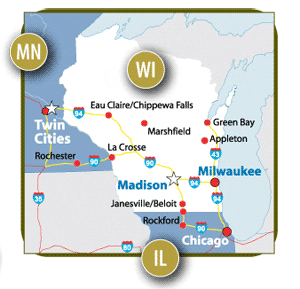I-Q CORRIDOR
Western Wisconsin and the Twin Cities area make up the western core of the I-Q Corridor, a region rich in ideas, innovative workers, investment capital and some of the world’s most exciting intellectual property—especially in biotechnology, the life sciences, information technology and advanced manufacturing.
 A distance of only 400 miles separates two dynamos of the Midwest economy—Chicago and the “twin cities” of Minneapolis and St. Paul. That’s a shorter drive or flight than what separates San Diego from the “Silicon Valley” in California.
A distance of only 400 miles separates two dynamos of the Midwest economy—Chicago and the “twin cities” of Minneapolis and St. Paul. That’s a shorter drive or flight than what separates San Diego from the “Silicon Valley” in California.
Strategically located between Chicago and the Twin Cities and traversed by Interstates 90 and 94 lies Wisconsin, one of the nation’s fastest growing technology states in its own right.
Minnesota
Minnesota’s tech-based economy is among the nation’s most vibrant. A 2006 report by the BioBusiness Alliance of Minnesota noted that Minnesota is home to more than 500 biobusiness technology enterprises spread over a number of sectors. Those enterprises employ 35,000 workers, about 22,000 of whom work in the medical devices sector, where Medtronics and Guidant are household names. Minnesota is a dominant player in medical devices, renewable fuels, materials science and delivery systems for drugs and therapeutics. Despite a decline in tech exports for the first time since 2002, Minnesota held its place at ninth in the nation, with $5.6 billion in tech exports in 2007, according to the 2008 Cyberstates survey. Minnesota exports $1.5 billion in both electromedical equipment and computer and peripheral equipment, ranking the state third and sixth in the nation, respectively. Leading research institutions include the University of Minnesota and the Mayo Clinic.
Illinois
 Illinois is the world’s 18th largest economy — and a huge market for technology products and services. It is a perennial U.S. leader in gross state product, high-tech employment, patent production and headquarters of Fortune 500 companies. Illinois has a long history of technological breakthroughs in biotechnology, chemistry, physics, computing and communications. Illinois is home to more than 440 corporate R&D facilities and more than 200 academic, government, and nonprofit research institutions. Its life sciences sector delivers a broad range of products and services, including medicines, medical devices, nutritional products, food and agricultural applications, alternative fuels, industrials and environmental solutions. The 2009 Cyberstates survey ranked Illinois seventh nationally in 2007 in the number of high-tech jobs. The state’s 211,800 tech workers are employed by 16,700 firms that contribute $16.6 billion in payroll.
Illinois is the world’s 18th largest economy — and a huge market for technology products and services. It is a perennial U.S. leader in gross state product, high-tech employment, patent production and headquarters of Fortune 500 companies. Illinois has a long history of technological breakthroughs in biotechnology, chemistry, physics, computing and communications. Illinois is home to more than 440 corporate R&D facilities and more than 200 academic, government, and nonprofit research institutions. Its life sciences sector delivers a broad range of products and services, including medicines, medical devices, nutritional products, food and agricultural applications, alternative fuels, industrials and environmental solutions. The 2009 Cyberstates survey ranked Illinois seventh nationally in 2007 in the number of high-tech jobs. The state’s 211,800 tech workers are employed by 16,700 firms that contribute $16.6 billion in payroll.
Wisconsin
Biotechnology is an $8 billion industry in Wisconsin, making up a cluster of more than 600 companies employing 19,818. Wisconsin is ranked in the top 10 for both biotechnology employment growth and the number of biotech companies, many of which can be found in the Madison area. The state has leading research facilities such as UW-Madison (currently second among U.S. universities in total research expenditures), the Medical College of Wisconsin and the Marshfield Clinic. It has growing capital markets, especially within angel networks; strong partnership organizations; a thriving cluster of science companies and a healthy climate for business, academic and government cooperation. Wisconsin has emerging centers of research excellence in tissue regeneration, personalized medicine, error-free hospitals, genetically-modified organisms, zoonotics disease control and small molecule pharmaceuticals. Its bioinformatics and medical devices clusters are strong and growing, led by companies such as GE Healthcare and TomoTherapy. Epic Systems is a leader in electronic medical records. Information technology and other high-tech goods and services are an emerging sector of the Wisconsin economy. In March of 2009, the annual Cyberstates survey showed that Wisconsin added 3,600 high-tech jobs in 2007, even while total private-sector employment declined in the U.S. Cyberstates data also ranked Wisconsin 12th nationally in high-tech exports in 2007, which totaled $3.9 billion. This amount represents an 86 percent increase since 2001.
Download the I-Q Corridor white paper



